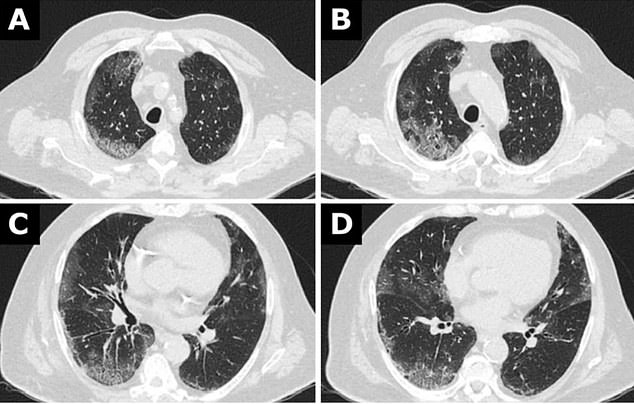
Covid could have been spreading in Germany in 2019, according to fresh evidence which casts more doubt over China‘s origin timeline.
Beijing didn’t alert the world about the mysterious virus circulating in Wuhan — the city at the centre of the pandemic — until New Year’s Eve 2019.
Yet a catalogue of studies have since poked holes in claims that Xi Jinping‘s regime blew the whistle as soon as it became aware a new disease was circulating. Experts have uncovered numerous signs that Covid was already in Europe before alarm bells were raised.
MailOnline has now unearthed a fascinating medical report which further discredits China’s official version of events.
Doctors in Berlin treated a 71-year-old man who had what they now suspect to be Covid, exactly one day before news broke of a cluster of Chinese patients were struck down with a SARS-like virus.

Do these CT scans of 71-year-old German man’s lungs taken on December 30 2019 prove Covid was spreading in the country one month before the first official case?




The German case happened one day before China officially notified the world about the Covid virus, but some reports said Beijing officials knew about the virus as early as November. File photo of medics at Wuhan Red Cross Hospital in January 2020
Medics from Charité–Universitätsmedizin re-examined his case now armed with the knowledge of tell-tale signs of Covid that might have been glossed over at the time.
They wanted to see whether the virus was circulating prior to Germany’s first official case recorded in January.
The man, who wasn’t identified, was admitted to hospital with pneumonia of an unknown cause on December 30, 2019.
He was in a ‘poor’ condition, with an elevated heart rate, blood pressure and a fever.
Medics noted he was overweight, a smoker, and had previously suffered a stroke.
But, critically, he had not been overseas recently, doctors wrote in the Journal of Medical Case Reports.
CT scans of his lungs indicated a potential viral infection of unknown origin, with tests for pathogens capable of causing pneumonia coming up negative.
But these scans show a pattern of damage now familiar to millions of medics across the world, a ‘crazy-paving’ style in his lungs typical of Covid.
The authors wrote: ‘Considering the chest computed tomography (CT) findings, it is likely that our patient is one of the earliest cases of Covid in Germany.
‘This case suggests that Covid was already spreading in Germany in December 2019.’
The patient himself needed to be put on a ventilator four days after admission as his condition deteriorated.
He spent a total of five days on a ventilator and was only discharged from hospital on January 28, nearly a whole month after his initial admission.
This was one day after the first officially confirmed Covid case in Germany — a case believed to be linked to meetings they held with a Chinese business partner.
Medics reported that the 71-year-old man later died in April 2020, but didn’t state the cause.
The authors said the case added to the growing body of evidence suggesting Covid was spreading in several European countries in late 2019.
This includes the virus being detected in wastewater samples in Italy in December 2019, almost two months before the first official Covid diagnosis in the country.
Separate analysis also found blood samples used in an Italian lung cancer screening trial in October 2019 later tested positive for coronavirus.
And samples collected from French patients in December that year — which were tested retrospectively — have also come back positive for the virus, a month before the first official cases were spotted.
Other findings, from Brazil and the US, have also reported that Covid was spreading much earlier than the first cases in either nation.
While the first cases in the UK were detected on January 29, 2020, among Chinese nationals who arrived from Wuhan, there are similar suspicions the virus was already here months before then.
Beijing has insisted the virus only originated in mid-December, weeks before they notified the world about the pandemic as more cases came to light.






Debate over the timeframe of when Covid emerged is also linked to a dispute over its origins. Pictured here is The Wuhan Institute of Virology (WIV) where a number of experts think Covid could have leaked from






But other Covid origin theories point to animals kept at Huanan Seafood Wholesale Market in Wuhan (pictured) as being the epicentre of the outbreak. Many of the earliest cases in December 2019 and January 2020 had visited the site, where live animals were sold
However, leaked documents from the Chinese Government indicate that officials were aware of some Covid cases as early as November, potentially costing the world precious time in the initial fight against the virus.
China has also repeatedly insisted Covid could have come from outside the country, suggesting it may come from frozen meat imported from elsewhere in Asia, and even at one point stating it may leaked from a US research lab.
The authors of the latest case report noted that they can’t officially diagnose their patient with Covid as blood samples taken from him have been disposed of and he never did a PCR test for retrospective analysis.
Debate continues of when exactly Covid emerged is also tied up in how the virus came to be in the first place.
Some scientists support initial theories that the virus came from an unconfirmed animal source, possibly bats, before it jumped to another species held at the ‘wet market’ at the centre of the outbreak and then onto people.
But other experts have said there is a growing body of evidence suggesting the virus actually leaked from the nearby Wuhan Institute of Virology, possibly as result of research being done there on coronaviruses.
Source: | This article originally belongs to Dailymail.co.uk